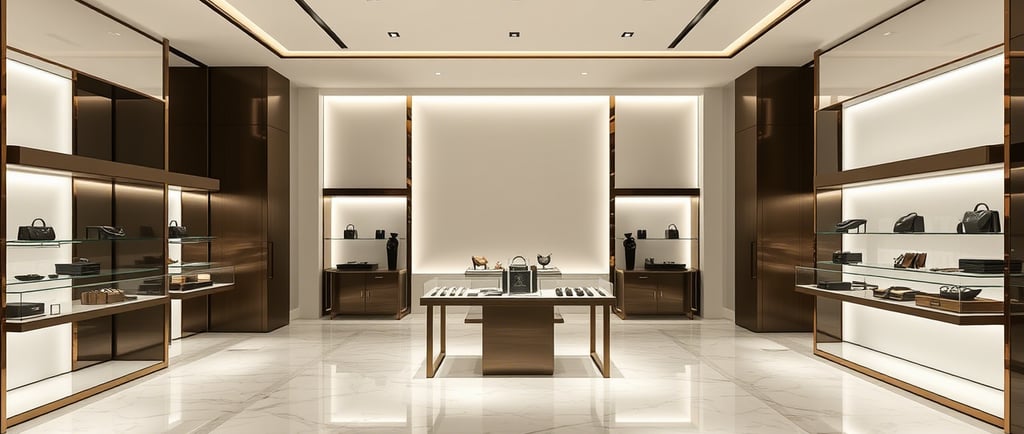Building Emotional Connections in Luxury Retail
10/8/20253 min read


When a client crosses the threshold of a luxury boutique, time itself seems to slow. The gentle click of Italian marble underfoot, the subtle fragrance that defines the space, the whispered greeting from an associate who remembers preferences without prompting—this is not shopping. This is theater. This is relationship. This is luxury.
The Emotional Architecture of Luxury
The luxury market has always operated on principles separate from traditional retail metrics. While mainstream commerce focuses on conversion rates and cost efficiency, true luxury thrives in a different ecosystem—one where emotions form the currency of exchange.
In the post-digital age, as transactions increasingly migrate to online platforms, the physical luxury experience has evolved into something more profound. Luxury spaces have transformed into emotional sanctuaries where the exchange of capital represents merely the conclusion of a carefully choreographed emotional journey.
Leading luxury brands understand that customers seeking premium experiences do not simply purchase products—they invest in feelings, memories, and identity statements. The Hermès scarf is not merely silk but a tactile connection to generations of craftsmanship. The bespoke suit from Savile Row carries within its stitches hours of human attention and care.
Beyond Service: The Art of Connection
Exceptional service has long been the baseline expectation in luxury environments. However, forward-thinking luxury retailers have moved beyond service toward genuine connection—recognizing that authenticity resonates more deeply than rehearsed courtesies.
This evolution manifests in various forms:
Narrative Engagement: Luxury associates now function as brand storytellers, weaving the heritage, craftsmanship, and uniqueness of each piece into a compelling narrative that resonates with the client's personal story.
Spatial Psychology: Innovative luxury boutiques design environments not merely for aesthetic appeal but for emotional resonance—spaces that subconsciously evoke feelings of exclusivity, comfort, or aspiration.
Sensorial Immersion: The engagement of multiple senses creates emotional memories that digital experiences cannot replicate. The weight of a watch, the sound of a car door closing, the texture of leather goods—these tactile elements forge emotional connections impossible to replicate online.
The Data-Empowered Emotional Experience
The next frontier in luxury retail merges emotional intelligence with technological sophistication. Advanced clienteling systems now enable associates to access preference data, purchase history, and personal milestones—not to increase sales pressure but to enhance emotional relevance.
Consider the premium automotive showroom that knows when a client's lease ends before the client remembers, or the jeweler who notes a significant anniversary approaching. These subtle attentions demonstrate care beyond commerce.
The true innovation lies not in collecting data but in translating it into meaningful emotional gestures. The future of luxury retail belongs to brands that can harmonize digital intelligence with human intuition.
Creating Emotional Equity
While financial metrics remain important, visionary luxury brands now measure success through emotional equity—the cumulative positive feelings and memories associated with the brand experience. This equity compounds over time, creating lifetime clients rather than one-time purchasers.
Building emotional equity requires investment in areas that defy traditional ROI calculations:
Time Generosity: Luxury experiences cannot be rushed. Associates must be empowered to spend time with clients without pressure for immediate conversion.
Recognition Systems: Sophisticated recognition extends beyond remembering names to acknowledging preferences, histories, and relationships.
Authentic Empowerment: Staff require genuine autonomy to create bespoke solutions for clients, moving beyond scripted interactions.
Emotional Intelligence as Competitive Advantage
As luxury markets evolve, emotional intelligence emerges as the decisive competitive advantage. Brands that foster genuine human connections will thrive while those focused solely on product superiority will struggle to differentiate.
The most forward-thinking luxury retailers are now investing in emotional intelligence training with the same commitment previously reserved for product knowledge. Understanding the subtle art of reading emotional cues, responding with appropriate warmth, and creating moments of delight becomes the new expertise.
The Luxury Promise
Luxury has always been more promise than product—a promise of exceptional quality, rarity, and meaning. In contemporary markets, this promise extends to emotional experiences that validate the premium investment.
The luxury boutique of tomorrow will function less as a point of transaction and more as a theater of connection—a space where clients feel not merely attended to but truly seen. In this evolution lies both the challenge and opportunity for luxury retail: to transform commerce into connection, transaction into emotion, and service into sincere relationship.
For those who master this art, the rewards transcend quarterly results. They create something far more valuable: emotional loyalty that endures beyond trends, technology shifts, and economic fluctuations—the true hallmark of luxury that lasts.
